PC and Prejudice: Gauging Divides in America’s Culture War
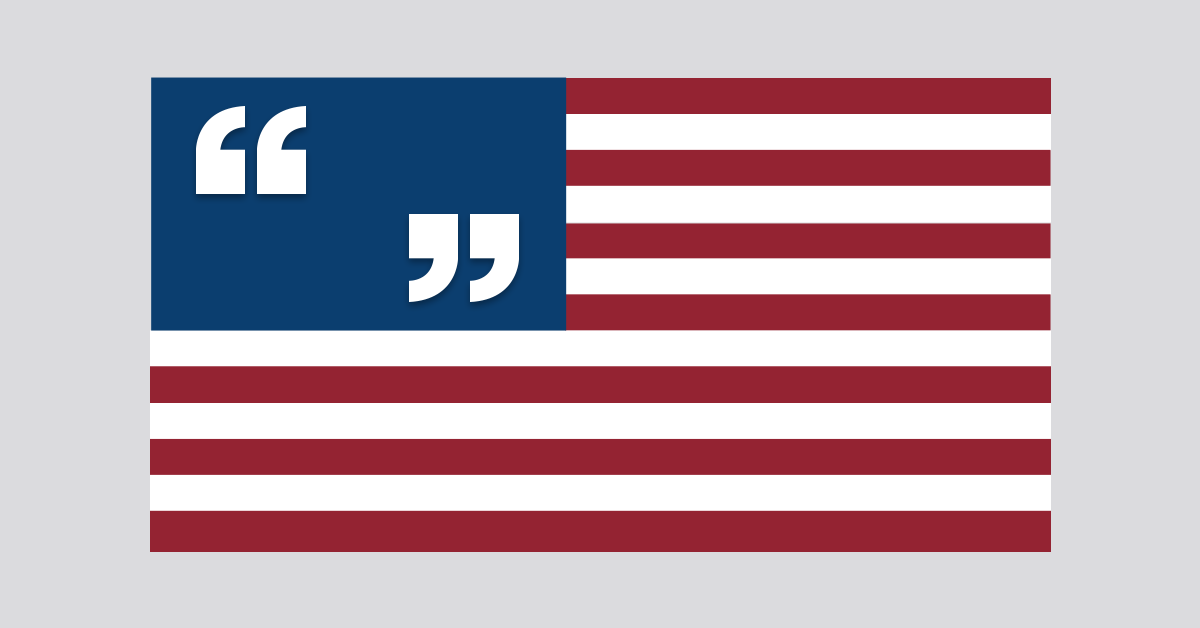
Key Takeaways
52% say there’s too much prejudice in the country vs. 48% who say there’s too much political correctness.
Most people, including those who said there’s too much political correctness, said they feel free to express their views on hot-button issues such as race and sexuality.
But 75% of adults say the current climate prevents open political discourse.
As the face of the United States continues to undergo rapid demographic and cultural change, the fervor against “political correctness” grows even more potent for many Americans who feel that their political, cultural and social power in the country is waning.
The backlash to so-called PC culture unites conservatives, many of whom argue that their First Amendment rights to free speech are under attack by the left.
But as the debate over political correctness gains prominence in modern politics, a new Morning Consult analysis, gathered from a survey of more than 13,000 U.S. adults, shows “free speech” is not necessarily an issue: A majority of PC culture critics feel that they are free to express themselves on a variety of issues -- from more abstract subjects concerning identity to hot-button topics that have featured prominently in the news cycle during the past few years.
Instead, the findings suggest that views of race- and gender-based privilege and discrimination, not free speech, serve more as a dividing line in the political correctness culture war, which has devolved into debates over which words we can and can’t use: Those who say there is “too much prejudice” are three times more likely than those who say there is “too much political correctness” to say discrimination, racism and sexism aren’t taken seriously enough.
A data experiment within the survey also indicates feelings about free speech are contextual: People are more willing to police certain types of speech if that derogatory language is aimed at groups they consider to be part of their tribe.
Who thinks we’re too PC
One common question in public opinion polling is whether there is “too much prejudice” or “too much political correctness” in the country today. Morning Consult has posed this question several times over the past two years, and the latest finding mirrors past results: Americans are closely divided on the issue.

Responses to this question strongly correlated with political ideology, but they aligned even more with sentiment toward President Donald Trump.
Those who said that there is “too much political correctness” are disproportionately white, male, Republican and supportive of Trump, who has characterized political correctness as a problem for the country.
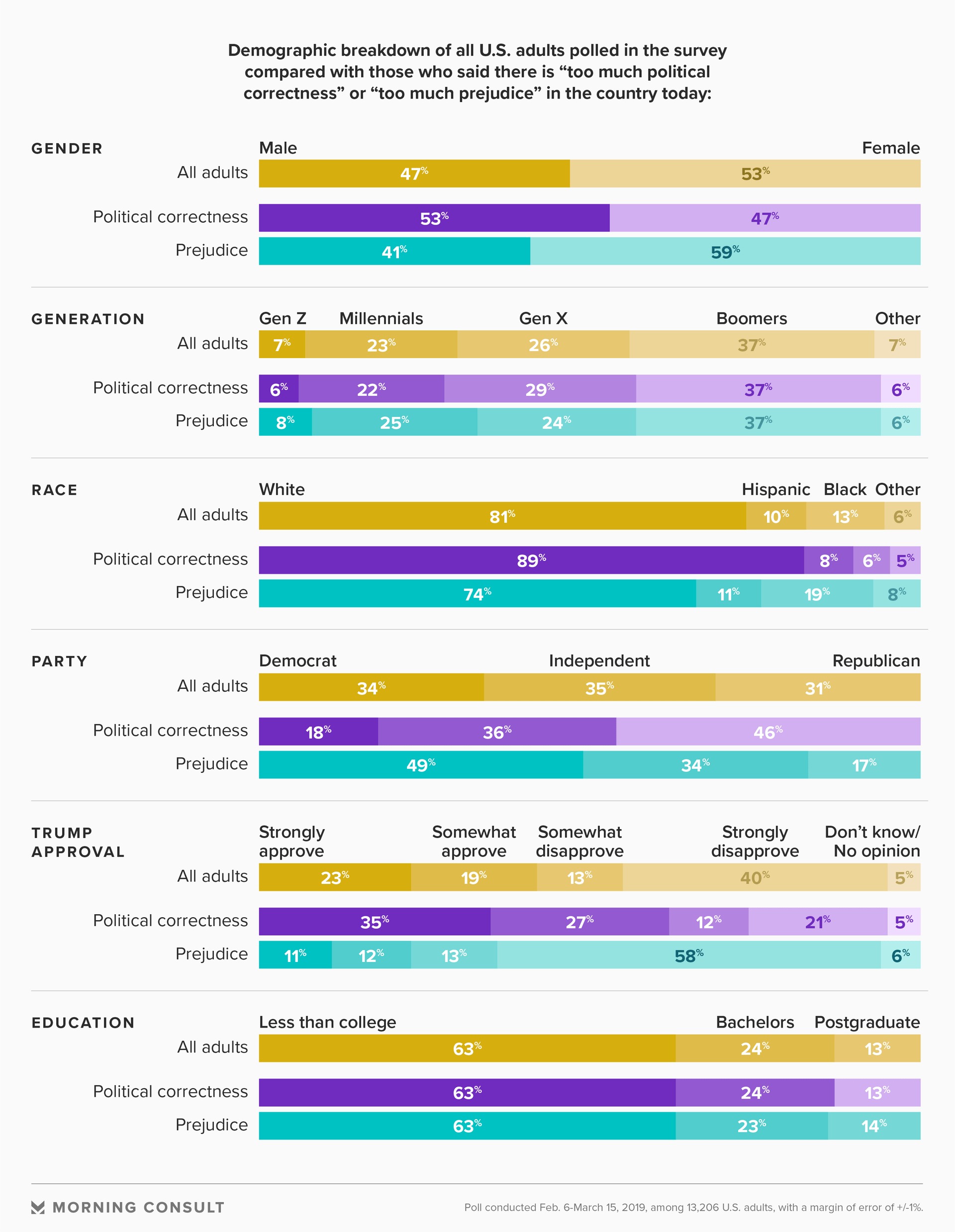
Notably, there are no significant generation, education or income divides between Americans who said there’s “too much political correctness” and those who said there’s “too much prejudice,” although those on the former side were slightly more likely to be wealthier.
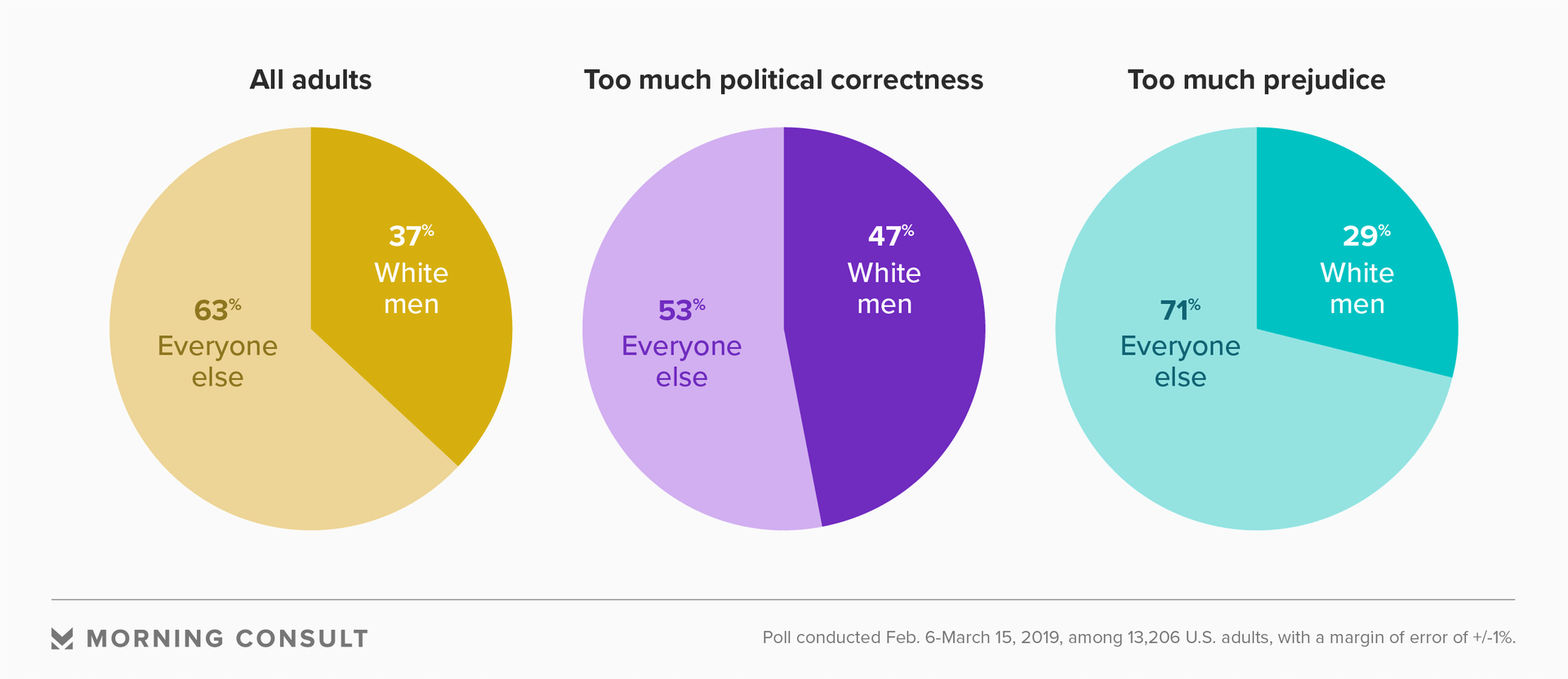
Nearly half of those in the “too much political correctness” camp are white men.
In an effort to understand what people mean when they say there is “too much political correctness,” the people who sided with that response were broken out to see how they responded to other parts of the poll. The same thing was done for those who picked “too much prejudice.”
What’s ‘off limits’ to talk about
The survey found that while there were significant differences among those two groups when it came to attitudes toward speech, even healthy majorities of the respondents who said that PC culture in the country had run amok also said it was acceptable for them to express themselves on a range of sensitive topics, such as race, gender, sexuality, immigration, religion and people who are different from them.
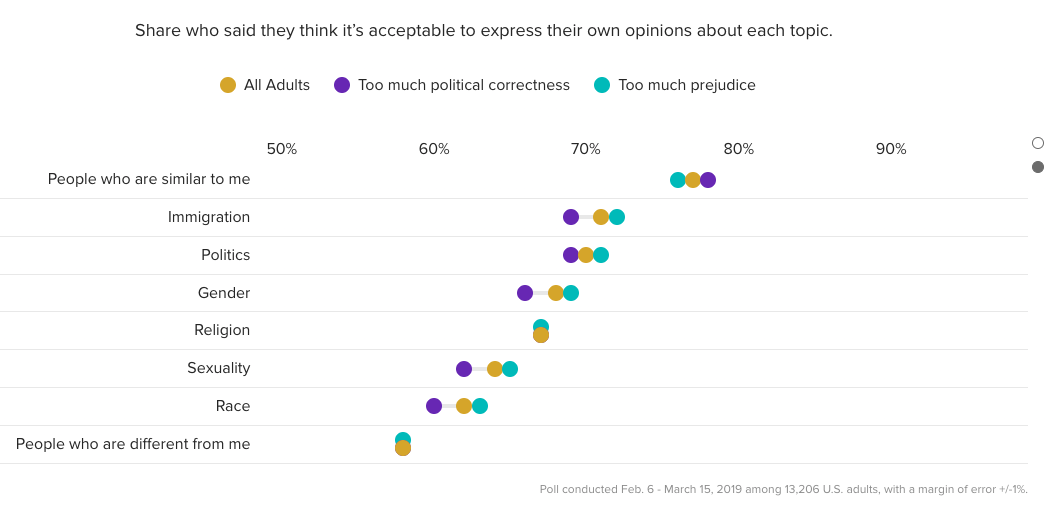
Even with issues that have proven especially divisive in the past two years, such as Black Lives Matter and the #MeToo movement, most of the anti-PC respondents said they felt comfortable expressing their opinions -- although to a slightly lesser extent than the “too much prejudice” camp.
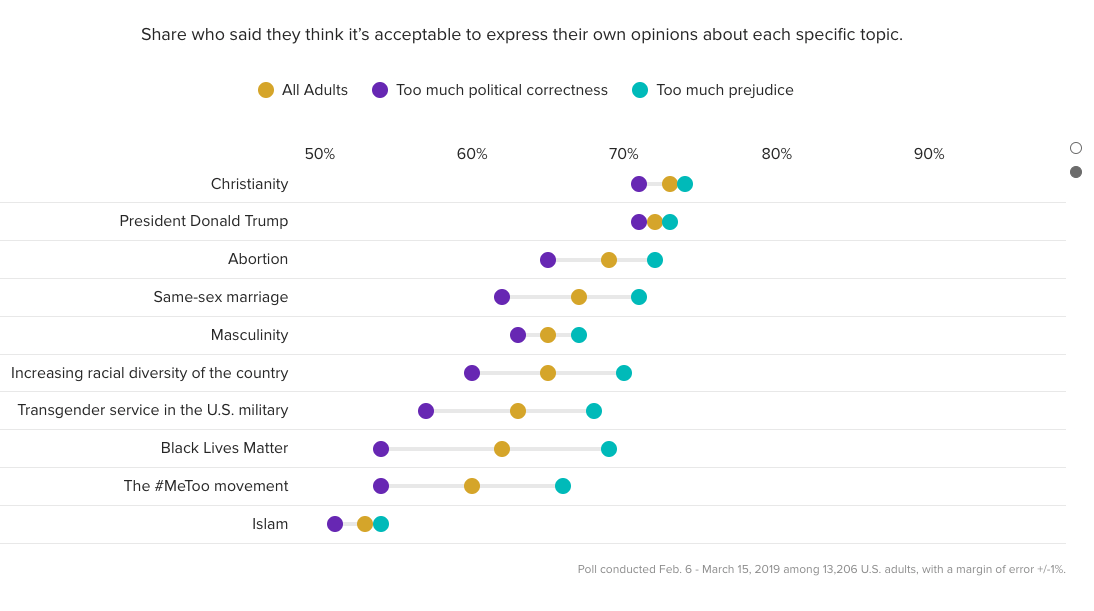
Free speech vs. social norms
While most of the people who viewed PC culture as too pervasive in American society generally felt free to express themselves on the aforementioned topics, they were also overwhelmingly more likely to express confusion about more abstract questions concerning the state of the country’s discourse.
Large swaths of these respondents agreed that the “rules” about what they can and cannot say are changing so fast it's difficult to keep up, that people are offended too easily these days and that the current climate prevents some people from saying what they believe because others might find it offensive.
But these were sentiments also shared with a majority of the poll’s broader population, suggesting that when it comes to free speech, Americans are not as nearly divided as some would argue.
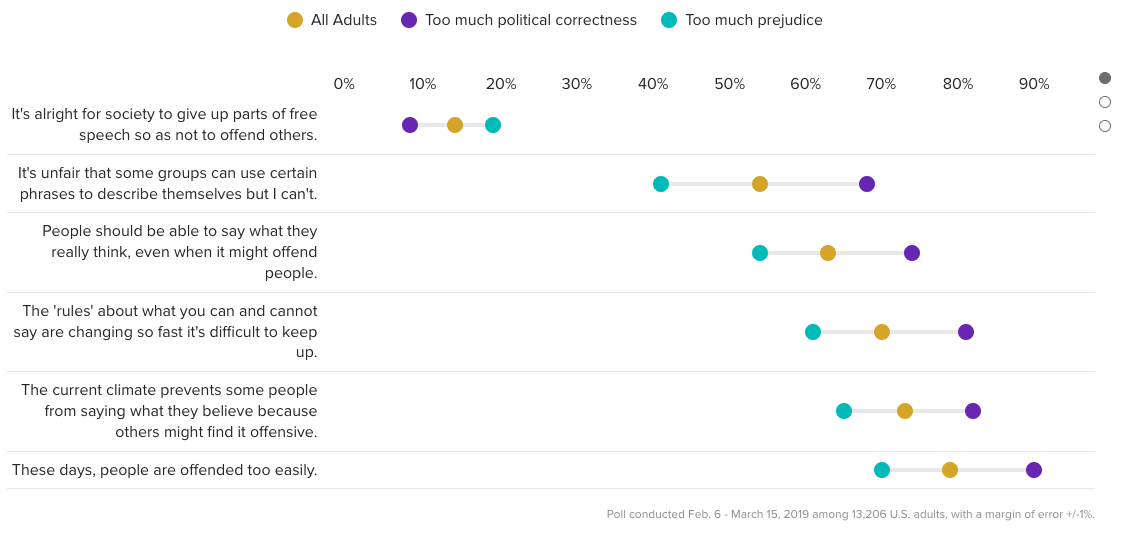
Bemoaning an overly PC culture is not as much a protection of your own rights as it is a political cudgel to wield against the opposition, said Kevin Kruse, a professor of history at Princeton University, adding that there’s a certain thread of victimhood in modern conservatism.
“It’s easy to present yourself as a victim, as someone who is being told not to speak, even if that is not the case,” Kruse said.
‘Politically correct’ is a loaded term
The contradiction among Americans’ views on many sentiments regarding free expression and barriers to free speech was matched by discrepancies regarding the term “politically correct” itself.
To test the phrase’s toxicity, the survey asked one half of the respondents whether they considered themselves to be politically correct and asked the other half if they identified with a general definition of political correctness: that they try to avoid saying and doing things that could be perceived as insulting to people who are different from them.
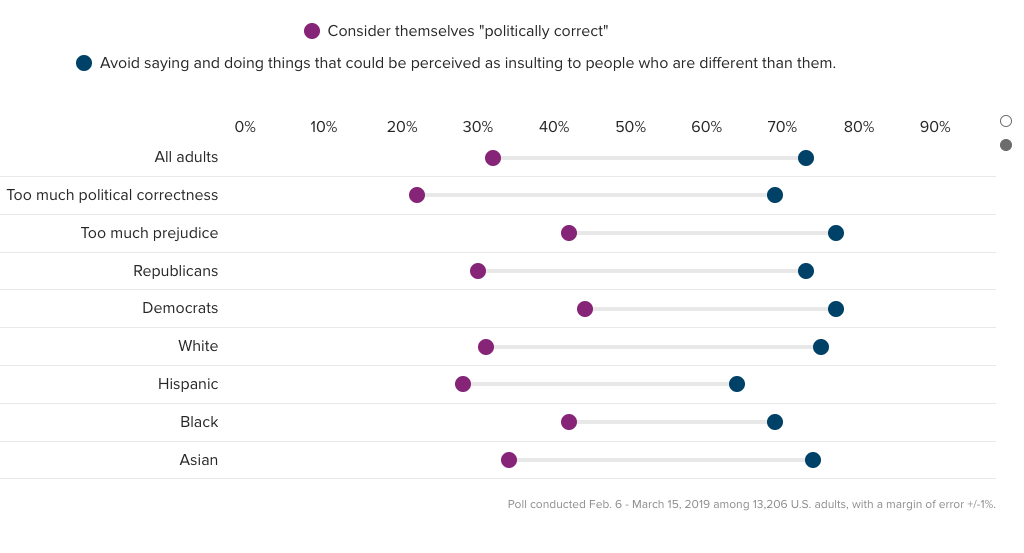
It turns out that people who don’t like the “politically correct” label will still try to adhere to that type of behavior. Adults who said there’s too much political correctness in the country were nearly three times as likely to say they tried to meet the political correctness definition than they were to apply the label to themselves. Those who said there’s too much prejudice in the country also shied away from the term, with less than half saying they considered themselves politically correct.
Shanto Iyengar, a political science professor at Stanford University, said grievances against PC culture’s adherents were largely rooted in suspicions of others being inauthentic.
“That’s the real subtext in the political correctness debate — is that people are giving insincere responses,” he said. “To be politically correct is disguising their true feelings.”
Privilege and discrimination
A good deal of that skepticism appears to be based on views of privilege and discrimination, underscoring that views regarding who has the upper hand in the country serve as the main fault line in the culture war.

Fissures emerged in the responses — some of the largest in the poll. At least 3 in 5 who said there was too much prejudice in the country sided with statements that white people don’t recognize the real advantages they have, that men start out with an advantage and that discrimination and racism are not taken seriously enough in modern society.

By contrast, most Americans who said there was too much political correctness in the country also said black people today don’t recognize the real advantages they have, that white people don’t have any real advantages over others, and that people nowadays are too sensitive about things having to do with discrimination and racism.
Nearly half of those respondents also disagreed that men start out with an advantage.
‘In-group’ vs. ‘out-group’ mentality
One important element underlying many conversations about political correctness is the social psychology concept of in-group vs. out-group. Essentially, people tend to be more sympathetic of those perceived as similar to them, or part of their in-group.
It helps explain why Democrats, who are more racially diverse, tend to be more sensitive to racial tropes -- and why Republicans, who have a larger share of military members in their ranks, hold a particular reverence for veterans.
Priming experiments typically measure sentiment among respondents by asking whether they agree or disagree with a number of phrases. The Morning Consult experiment went one step further in measuring how the in-group vs. out-group dynamic applied to tolerance for free speech.
The survey sought to test this concept by priming respondents with sentences that presented typically out-group members as in-group members. Here’s an example meant to sway conservatives:
“Many Muslims have served in the U.S. military. Do you agree or disagree with the following? Politicians should be able to say the values of Islam are un-American.”
Half of respondents received that priming sentence. The other half simply saw:
“Do you agree or disagree with the following? Politicians should be able to say the values of Islam are un-American.”
The idea behind the experiment was to determine whether compassion for a perceived out-group would increase if people feel as though those individuals were actually part of their in-group. And indeed, respondents who saw the priming sentence were more likely to say politicians should not be able to express certain views about that out-group.
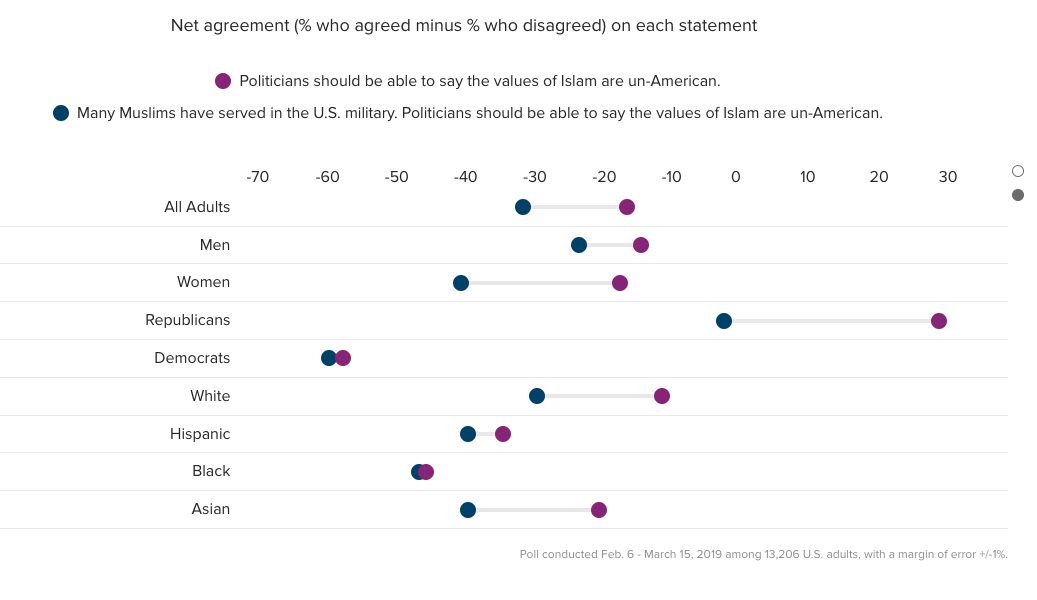
Paul Djupe, an associate professor of political science at Denison University who helped craft parts of the poll, called the “eye-opening” results an example of how information can weaken stereotypes for some of the most polarized groups in the country, and how empathy, in turn, directly feeds into views on which kinds of speech should be tolerated or allowed.
The findings of the experiment suggests a begrudging acknowledgment that some speech should be policed, Djupe said, because respondents’ views changed with the addition of the priming sentence.
In essence, he said, this suggests that people know it’s wrong to hold and express certain views.
Other examples of the experiment, including those designed to elicit more compassionate responses from Democrats or liberals toward certain groups, also provided fruitful results. (The below results were drawn from a separate survey of roughly 2,200 U.S. adults.)
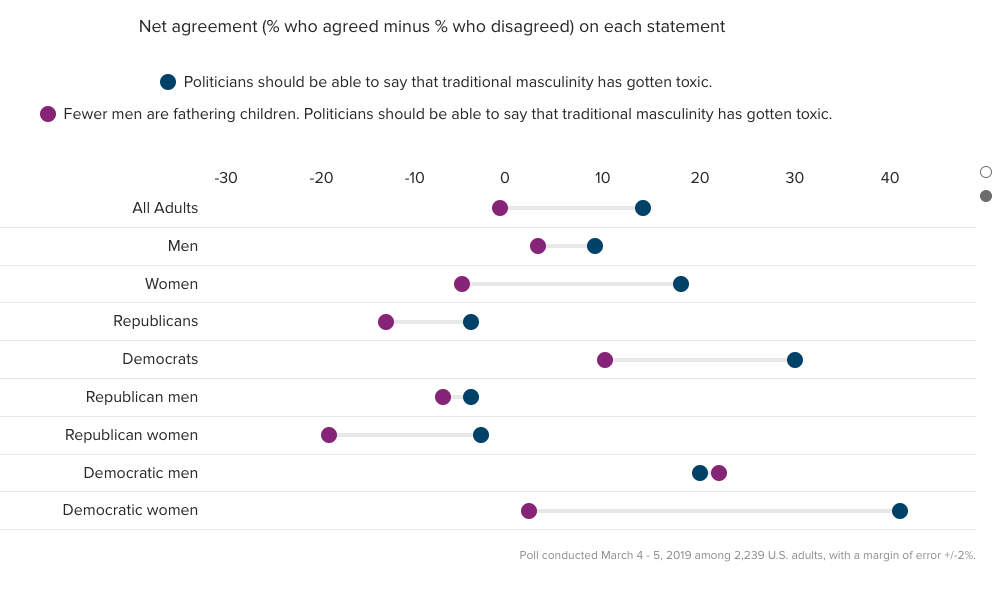
“This reinforces the value of news — the possibility that people are open to information,” Djupe said, “It’s suggestive that we can be civil to each other and be inclusive as a democratic society.”
Samantha Elbouez and Marley Bross contributed to visuals and development.
Thanks to Dan Cox, Paul Djupe, Shanto Iyengar, Dean John L. Jackson and Heidi Kitrosser for their help in crafting the survey.
Cameron Easley is Morning Consult’s head of political and economic analysis. He has led Morning Consult's coverage of politics and elections since 2016, and his work has appeared in The New York Times, The Wall Street Journal, The Washington Post, Politico, Axios, FiveThirtyEight and on Fox News, CNN and MSNBC. Cameron joined Morning Consult from Roll Call, where he was managing editor. He graduated from the University of North Carolina at Chapel Hill. Follow him on Twitter @cameron_easley. Interested in connecting with Cameron to discuss his analysis or for a media engagement or speaking opportunity? Email [email protected].
Eli Yokley is Morning Consult’s U.S. politics analyst. Eli joined Morning Consult in 2016 from Roll Call, where he reported on House and Senate campaigns after five years of covering state-level politics in the Show Me State while studying at the University of Missouri in Columbia, including contributions to The New York Times, Politico and The Daily Beast. Follow him on Twitter @eyokley. Interested in connecting with Eli to discuss his analysis or for a media engagement or speaking opportunity? Email [email protected].
Joanna Piacenza leads Industry Analysis at Morning Consult. Prior to joining Morning Consult, she was an editor at the Public Religion Research Institute, conducting research at the intersection of religion, culture and public policy. Joanna graduated from the University of Wisconsin-Madison with a bachelor’s degree in journalism and mass communications and holds a master’s degree in religious studies from the University of Colorado Boulder. For speaking opportunities and booking requests, please email [email protected].
Related content

As Yoon Visits White House, Public Opinion Headwinds Are Swirling at Home

The Salience of Abortion Rights, Which Helped Democrats Mightily in 2022, Has Started to Fade
